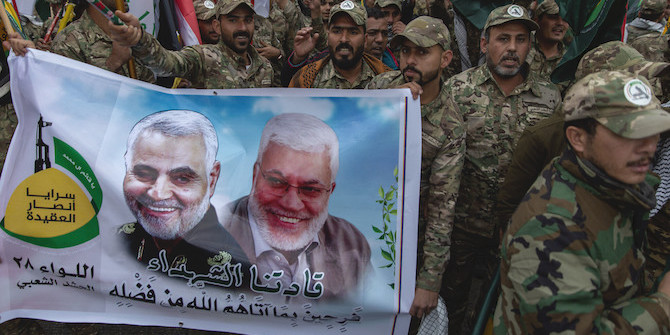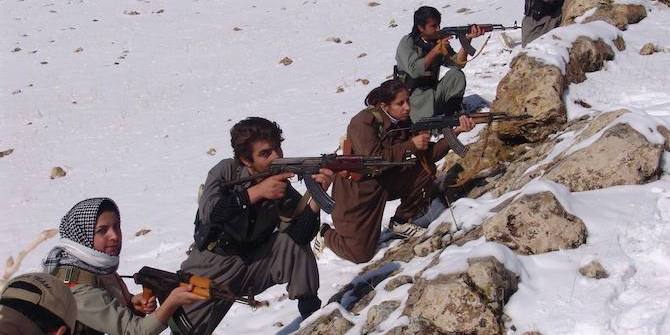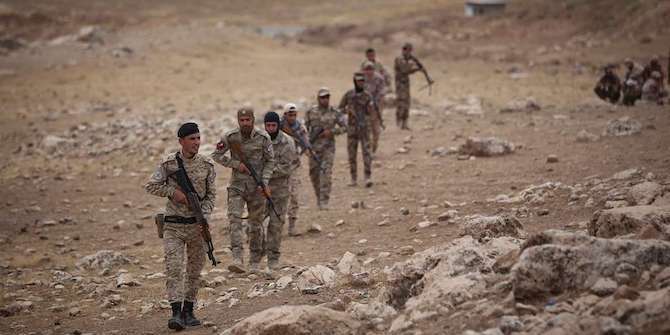by Afrah Almatwari

This blog post examines the novel Saturday by Ian McEwan, which takes place in the shadow of the great London marches of 15 February 2003, before the Iraq invasion. The novel tells the story of a day in the life of a neurosurgeon named Henry Perowne and depicts the contentious debate present in British society about the justifications for initiating war in Iraq and its ethical implications. Through the two main characters, Perowne, who is pro-war, and his daughter Daisy, who is anti-war, this article analyses whether humanitarian crises justify military intervention, as well as the irrationality of fighting terrorism militarily. It shows that Saturday is just one example of how literature can be instructive in examining justifications for major political events, such as the invasion of Iraq.
Perowne: The Pro-war Interventionist
Perowne’s support for the war is driven by 9/11-related trauma, humanitarian concerns, and the establishment of a democracy. He embodies the 9/11-affected and traumatised British citizen. McEwan opens the novel with the scene of a plane crash that Perwone sees from his window. He observes a burning plane making an emergency landing at Heathrow Airport and thinks it is a terrorist attack. This scene shows how people feel the pressure of the political climate in the world. According to McEwan, these attacks give way to a new perception and alter people’s understanding of the world around them. Later, when Perowne reflects in private on the political debate around the Iraq war, he sees the groups that participated in the march as a threat to his life because they remind him of organisedterrorist groups. Trauma is therefore one of the impetuses that Perowne uses to advocate for the invasion of Iraq.
Perowne’s support for the war is also motivated by humanitarian concerns and the establishment of a democratic government in Iraq. He argues that invading Iraq is necessary to liberate Iraqis from Saddam’s enslavement and torture. In this way, his work is in line with that of many lawmakers and rights-based theorists who argue for the necessity of foreign intervention during humanitarian crises. For example, Caroline Kennedy-Pipe argues that the prioritisation of so-called human security underlines Blair’s confidence concerning the universality of certain Western political values. She claims that the humanitarian impetus is greater than any other impetus that Blair uses to convince the British people about this war. Accordingly, in the story, McEwan (p. 52) points out that Blair is expected to emphasise the humanitarian justification for war in a speech in Glasgow. In Perowne‘s view, it is the only case worth making.
Like Blair, Perowne argues that Saddam’s regime is a dictatorship that committed massive massacres, genocide, executions, ethnic cleansing, and many other human rights violations against Iraqis and should be overthrown. His attitude is influenced by his friendship with the Iraqi professor Miri Taleb, who was tortured by Saddam’s followers. Meri narrates horrifying stories about how Saddam tormented Iraqis who opposed his rule. Perowne’s stance was further influenced by reading The Republic of Fear by Kanaan Makya; a book that reveals the violence of the Iraqi regime, recording the abuses perpetrated by its victims, the Kurdish and southern Iraqi rebels, as Trabulsi described. Therefore, Perowne was convinced that ‘Miri was right; it’s a republic of fear; Saddam‘s organising principle was terror’ (p.72). McEwan (p. 121) says, ‘if Perowne hadn’t met and admired the professor, he might have thought differently about the coming war’. This passage indicates that Perowne’s advocacy for the war was influenced by Miri’s status as an exile in Britain. It represents a broader role for Iraqi exiles in the war against Iraq.
However, despite Perowne’s satisfaction with the humanitarian incentives of the war, he does not deny his pessimism about the likeliness of casualties among Iraqis. He asserts, ‘Saddam could be overthrown at too high a cost’ (p.145). He also interrogates and suspects Blair’s allegations that Saddam has weapons of mass destruction (WMD) and that this war will bring world peace. This duality in Perowne’s view indicates the state of uncertainty that McEwan emphasises and defines in British people at the start of the twenty-first millennium due to the anxiety, trauma, and uncertainty caused by the terrorist attacks in New York.
Nevertheless, despite his reservations, Perowne refutes his doubts and predicts that this war will be short and achieve its goal of establishing a democratic system that respects human rights with fewer casualties than those caused by Saddam Hussein. Therefore, he supports limited intervention for greater profit.
Daisy: The Anti-War Activist
Daisy represents the anti-war activists who demonstrate against Tony Blair and the Labour Party’s decision to go to war. One of her arguments is that this war will trigger more hatred against western countries. Noam Chomsky predicted the devastation of this war, including terrorist reprisals, would spread across Iraq and the globe. Slavoj Zizek also warned that this intervention is the first direct American occupation of a large and key Arab country, which will generate universal reactionary hatred toward the US and its allies. Therefore, Daisy (p. 329) criticises the British government for agreeing with and following the US government’s policies. She describes the Bush administration as greedy, irrational, and with colonial motives. She warns Blair’s government against accepting and following them because they will harm the country on different levels—social, economic and political.
Another argument presented by Daisy is that humanitarian motives are not the underlying purpose of this war; oil is. The German theorist Carl Schmitt argued that whoever invokes humanity wants to cheat. Conceptually, humanity is a powerful ideological instrument for imperialist expansion and an economic imperialist vehicle in its ethical-humanitarian form. Hence, humanitarian claims are merely a pretext for US colonialism in Iraq. Daisy says (p. 325):
When the Americans have invaded, they won’t be interested in democracy, they won’t spend any money on Iraq, they’ll take the oil and build their military bases and run the place like a colony.
She argues that America wants to occupy Iraq for its resources and strategic location to build military bases and control the Middle East and threatens Iran, America’s antagonist.
Daisy’s third argument is that victims must earn their freedom; it cannot be bestowed upon them by a third party because it could have unfavourable consequences. Thus, another argument she makes to her father is (p. 336):
You don’t plant seeds with cruise missiles. They’re going to hate the invaders. The religious extremists will get stronger. There’ll be less freedom, more writers in prison…it’ll be a mess and even you will wish it never happened.
She argues that using force to impose one’s will, principles, or culture on others is anti-democratic. Hence, those who should be liberators become oppressors.
Baxter’s Invasion Allegory
A final key character introduced by McEwan is Baxter. On the day of the London march against the Iraq invasion, Perowne gets into a minor car accident with Baxter in the street where the march is taking place. Baxter is diagnosed instantly with brain dysfunction by Perown, who tries to coerce him into getting surgery. A conflict ensues when Baxter attacks Perowne’s house later that day. Eventually, the daughter, Daisy, saves the family from Baxter’s threat by reading him a poem called Dover Beach, which calms him down and allows Perwone to capture him and perform brain surgery on him.
Baxter’s invasion of Perwone’s home represents the futility of employing military measures to combat terrorism. The role of Daisy’s poem in defending her family from Baxter’s invasion suggests that for McEwan, the use of force in the US’s campaign against terror is ineffective. Instead, McEwan implies that since radicals have been brainwashed and guided by ideology, they need literature, logic and the dismantling of their beliefs.
In conclusion, by examining the beliefs of both pro- and anti-war groups, McEwan indicates that British society is divided over the Iraq invasion. This division is the result of the trauma caused by 9/11, the justifications presented by politicians, and ethical considerations. However, Baxter’s resistance to Perowne’s attempts to control him and his submission to Daisy’s poem refers to the importance of overcoming radicalism using peaceful means. However, McEwan’s minimisation of the mass marches throughout the novel suggests that the invasion will occur and be successful militarily with or without the UN, regardless of government statements or mass demonstrations, and the existence or non-existence of WMD (p.330).
[To read more on this and everything Middle East, the LSE Middle East Centre Library is now open for browsing and borrowing for LSE students and staff. For more information, please visit the MEC Library page.]






